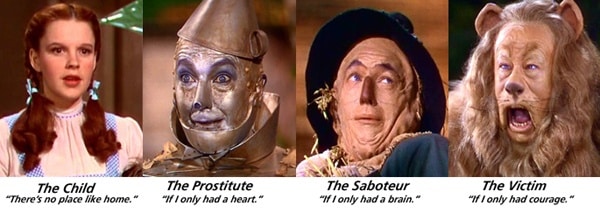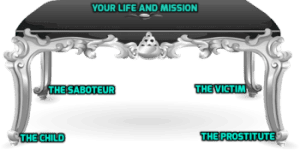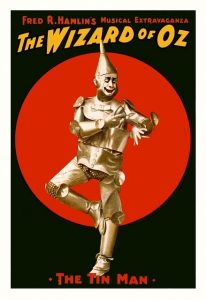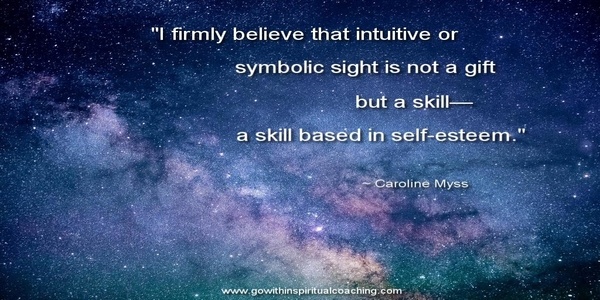
THE FOUR SURVIVAL ARCHETPYES

THE FOUR SURVIVAL ARCHETYPES
The Wizard of Oz is a great example of Joseph Campbell’s, The Hero’s Journey, and the Four Survival Archetypes. The archetypes, the Child, the Prostitute, the Saboteur, and the Victim, are all involved in and symbolize our significant life challenges related to survival.
Each one represents concerns, issues, fears, and vulnerabilities that cause you to negotiate away your spirit’s power in the physical world. They must be confronted and overcome and made into allies to become your guardians. They will preserve your integrity and not allow you to bargain it away for your survival.
In her book, Sacred Contracts, Caroline Myss compares these four archetypes to a table’s four legs. The table legs represent your relationship to the ground beneath your feet and to the universal energy that supports your life. They need to be stable to support the weight of the tabletop—our life and mission.
and to the universal energy that supports your life. They need to be stable to support the weight of the tabletop—our life and mission.
Despite the connotation of their names, the four survival archetypes are neutral and are the intimate companions of your intuition.
The Child—Guardian of Innocence
The Child archetype resides in everyone and is the first archetype you identify. Therefore it is your beginning point. This archetype sets up our earliest perceptions of life, safety, loyalty, and family, and its core issue is dependency and responsibility.
Its many aspects include the Wounded Child, the Abandoned or Orphan Child, the Dependent Child, the Innocent Child, the Nature Child, and the Divine Child.
Regardless of which aspect of the Child you relate to most intimately, this archetypal pattern brings you to meet your guardian of innocence. The Child helps heal, repair, and teach you what you need to care for in yourself.
In the Wizard of Oz, Dorothy—the Child archetype and looks for attention as she struggles to be heard and recognized by the adults (the child seeking self-authority, responsibility).
The Saboteur—Guardian of Choice
The Saboteur archetype, neutral energy within you, makes itself known mostly through disruptions, and its purpose is to help you learn the many ways you undermine yourself. The Saboteur’s fears and issues are all related to low self-esteem that causes you to make choices that block your own empowerment and success.
You can silence the Saboteur with acts of courage and by following your intuition. This is done through gut instincts that direct you to take action based on hunches rather than logic. To learn to experience that voice, you must respond to it. Start with making small choices.
The Saboteur’s core issue is fear of inviting change into your life, a change that requires responding positively to opportunities to shape and deepen your spirit. The choice to respond to an inner voice that directs you to pursue your spiritual life is obviously one that can rearrange your familiar world.
The Scarecrow—the Saboteur, points in one direction and then another because he can’t make up his mind. He is stuck on a pole and announces that he’s a failure because he hasn’t got a brain. This is the Saboteur in the shadow aspect.
The Prostitute—Guardian of Faith
The Prostitute archetype, although not thought of in kindly terms, is also neutral energy within you. We learn the great gift of never again compromising our body, mind, or spirit from this archetype. The Prostitute comes into play when our survival is threatened.
Its core issue is how much you are willing to sell of yourself—your morals, your integrity, your intellect, your word, your body, or your soul—for the sake of physical security. The Prostitute archetype also dramatically embodies and tests the power of faith. If you have faith, no one can buy you.
Confronting the
The Tin Man—the Prostitute—is standing alone in a forest, frozen and unable to speak. The Tin Man complains that he hasn’t got a heart and sings about how loving he would be if he had one. He could then love freely without becoming frozen in fear. The heart here is symbolic of his faith in himself.
The Victim—Guardian of Self-Esteem
The Victim archetype, like the other three survival archetypes, is an energy pattern that provides you with an opportunity to stand up to your fears. It may manifest the first time you don’t get what you want or need, or you’re accused or punished for something you didn’t do.
The victim’s core issue is whether it’s worth giving up your own sense of empowerment to avoid taking responsibility for your independence. Its primary objective is to develop self-esteem and personal power. When you’re in a situation where you feel threatened, take notice of that reaction physically, emotionally, and mentally. That is the intuitive voice of your inner Victim.
The Cowardly Lion becomes the Bully/Coward archetype but quickly transitions to the fourth and final Survival Archetype—the Victim. He claims he has no courage and is, therefore, always the Victim. He complains about how unbearable his life has been (seeking pity—shadow) and wants to be given courage so he can be victorious (light).
In conclusion, the Child, the Saboteur, the Victim, and the Prostitute are the intimate companions of your intuition. They make you conscious of your vulnerabilities, your fear of being victimized and allow you to see how you sabotage your dreams. These four archetypes will become your guardians, preserving your integrity and refusing to allow you to negotiate it away under any circumstances. They will allow you to become completely self-reliant; through them, you will come to see options where others see excuses.
The more conscious you can remain about the archetypal patterns influencing your behavior, the more likely your choices and lessons will be positive. If your choices are made unconsciously, and you act defensively and fearfully, you may not learn and grow as you should. Hopefully, you will learn from them.

